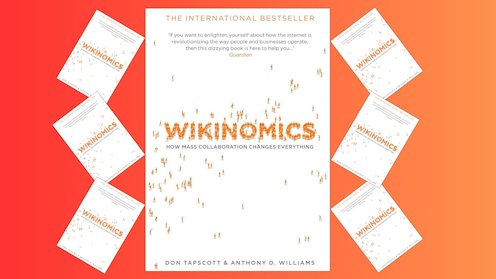
I have a confession to make. Despite being an academic, I do not actually read many books. In truth, I don’t often find books about what I like. My interest is on how the latest technologies affect business, and this topic is usually covered better by research articles and the press.
In the days when I was a student and money was tight, I was even less likely to buy books. But one exception was Wikinomics: How Mass Collaboration Changes Everything (2006). Written by Canadian tech thinkers Dan Tapscott and Anthony D. Williams, it captured my interest in how new innovations can change our personal and professional lives – and how exciting this change can be. Clearly I was by no means the only one that felt this way, as the book became a tremendous success.

Welcome to our new series on key titles that have helped shape business and the economy – as suggested by Conversation writers. We have avoided the Marxes and Smiths, since you’ll know plenty about them already. The series covers everything from demographics to cutting-edge tech, so stand by for some ideal holiday reading.
The title, a compound of Wikipedia pages and economics, followed in the style of the equally successful Freakonomics (2005), but Wikinomics is very much a landmark in its own right. What it conveyed powerfully was that the level of mass collaboration and sharing online was about to move way beyond what we had seen in the first 15 years of the internet, transforming how people did business.

These were much more than mere technological advances, the book argued, and would require a completely different business mindset and philosophy. This was all about openness, sharing, freedom to innovate, and acting globally.
Wikinomics highlights seven new models of collaboration:
1. Open-source software.
Software whose source code is made available for everyone to use and build on, which provides a way for firms and coders to coalesce around the same standard. One of the key early driving forces was the Linux operating system, while the book also points to Wikipedia as the archetypal example of the collaborative mindset.
Today, we see many examples of standalone coders coming together from around the world to build applications that are decentralised, meaning they’re not owned by anyone or based anywhere. Decentralised finance (defi), for instance, is offering a new way for people to do everything from trading financial assets to taking out mortgages.
2. Crowdsourcing innovative talent.
This allows organisations to solve problems with ideas from outside, typically from other parts of the world. The example given in the book is InnoCentive (now Wazoku Crowd), a site where organisations post scientific challenges and offer rewards for their solution.
3. Prosumers.
These are forward-thinking consumers who co-create products and services. In 2006, for instance, users of the virtual world, Second Life, were creating virtual buildings then renting them to other users. Today, fans of computer games such as Total War: Warhammer III are creating new characters and environments in a similar way.
4. Innovators sharing information.
Making data widely available for others to use has particular importance in helping solve humanity’s greatest challenges, such as climate change. The increasing popularity of open-access publishing of academic research has been an important step in this direction.
5. Open platforms.
Software that allows largely unrestricted access to its content and data gives businesses and individuals more room to collaborate and create new products. One example in the book is Google Maps, which was used by US entrepreneur Paul Rademacher to create a service called HousingMaps. It took data from Craigslist about homes for sale in a given area and pinned them on a map so that anyone searching for a home could see all the available locations at the same time.
Combining capabilities in this way became known as mash-ups, and can be seen today in a service like online bank Revolut. Revolut brings together services and information from a broad variety of organisations and offers them in an integrated way that is easy to use.
6. Mass collaboration in manufacturing.
The book noted how a manufacturer like Boeing had shifted from designing everything in-house and sourcing specified parts from individual suppliers to instead having suppliers working together to design parts themselves and then assemble them in teams in Boeing factories.
This switch in emphasis from supply chains to ecosystems has more recently been typified by Shenzhen in China, where collaborative manufacturing in everything from circuits to touchscreens blurs the boundaries between the companies involved.
7. Modern workplaces that avoid hierarchies and silos.
Instead of rigid structures, the driving force is social connectivity and fun.
Pros and cons
As is often the case with hugely successful books, Wikinomics was a combination of a great title, good writing and timing. By 2006 many of these trends were well underway. For instance, it was already common for coders to use open-source software like Linux for mass global collaboration. But if the book had been more original, it would not have been so well timed for mass market appeal.
A common criticism of Wikinomics is that it created many obscure terms that will only be familiar to those who have read the book. For example, its fourth collaborative model is called “ideagoras”, which hasn’t exactly caught on. No doubt the authors could have used simpler existing terms, but this is not the main weakness of the book.
With the benefit of hindsight, Wikinomics emphasised the positives of mass collaboration but did a poor job of foreseeing the challenges. Openness has made the world much more vulnerable to cybersecurity hacks, frauds and privacy breaches. Our behaviour online is now endlessly recorded and analysed, making people feel both distrustful and powerless.
What the book did do very well was to frame the issues around the new collaborative economy and explain them clearly. It helped readers to organise the new and old information in their minds, making it easier for them to analyse developments and be part of the revolution.
As a lecturer that teaches business on an executive MBA course to experienced managers, this is something I can appreciate. I cannot always tell them something they have not heard before, but if I can frame the issues well and communicate them clearly, it’s still useful to them. This is ultimately what Wikinomics did: it helped clarify the issues readers already had some understanding of, helping to shape the business zeitgeist for web 2.0.
Alex Zarifis does not work for, consult, own shares in or receive funding from any company or organisation that would benefit from this article, and has disclosed no relevant affiliations beyond their academic appointment.
This article was originally published on The Conversation. Read the original article.







